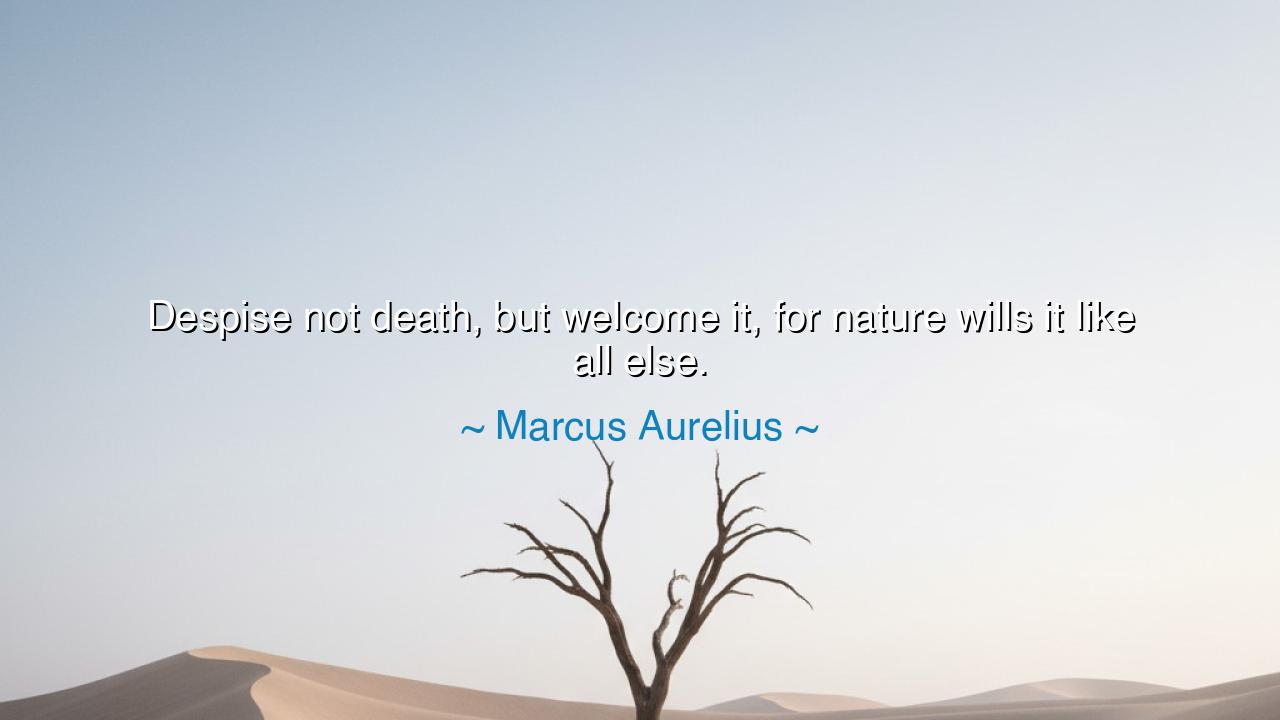
Despise not death, but welcome it, for nature wills it like all






“Despise not death, but welcome it, for nature wills it like all else.” Thus wrote Marcus Aurelius, the philosopher-king of Rome, whose meditations under the stars still guide the hearts of those who seek serenity amidst the storms of life. In these words lies the essence of Stoic wisdom—a quiet, steadfast acceptance of the order of nature, and an understanding that death is not an enemy to be feared, but a friend to be received when the appointed hour arrives. For the one who lives in harmony with nature must accept all that nature decrees—birth and decay, joy and sorrow, rising and falling—as parts of one divine and eternal cycle.
The origin of this thought can be found in the Stoic philosophy that shaped Aurelius’s life and rule. As emperor of the vast Roman world, he faced wars, plagues, and betrayal, yet in his writings—composed not for others but for his own soul—he constantly reminded himself of the impermanence of all things. To despise death, he realized, is to despise the very fabric of existence, for death is not a punishment but a continuation of the law that gives life meaning. Everything that is born must end; everything that blossoms must fade. To fear death is to rebel against nature itself, and no man can find peace in rebellion against the eternal order.
Aurelius saw that nature wills death as surely as it wills dawn and dusk, growth and decay. Just as the leaf falls in autumn to nourish the soil for spring, so too must each human life end to make way for others. To welcome death, then, is to trust the wisdom of the universe—to surrender with dignity to the same power that first breathed life into us. “You have lived as a citizen of the world,” Marcus wrote. “Why fear to depart from it? The same power that brought you in will bring others.” To live without hatred of death is to be free, for what can terrify a soul that understands it belongs wholly to the rhythm of creation?
There is a story from the life of Socrates, the philosopher whom Marcus admired, that mirrors this truth. When condemned to die by poison, Socrates did not weep or rage. He spoke gently to his followers, saying that death might be a blessing, for either it is a dreamless sleep or a passage to another realm. In that moment, he embodied the spirit of Aurelius’s later teaching—calm acceptance in the face of the inevitable. His final act of drinking the hemlock was not despair, but obedience to nature’s will, which had decreed that his time among men was complete.
This acceptance is not the cold resignation of one who no longer cares for life, but the serene courage of one who understands that all things have their proper end. Marcus Aurelius loved life deeply—he cherished the beauty of the morning light, the laughter of his children, the wisdom of friendship—but he did not cling to these things as though they were his possessions. He knew that to love life rightly is to love it as a traveler loves an inn: with gratitude for the rest, but without illusion that it is his permanent home. Thus, to welcome death is to love life in its fullness, neither denying its gifts nor fearing its completion.
Yet there is something heroic in his words as well, a call to face death not only with acceptance but with honor. The soldier who falls defending his people, the mother who endures pain for her child, the philosopher who dies for truth—they all walk in the same spirit that Marcus described. To see death as part of nature’s law is to face it without trembling, to look upon it as a returning to the great source from which all being flows. For the Stoic, the measure of a man is not how long he lives, but how courageously he lives—and how calmly he meets his end.
The lesson of Marcus Aurelius, then, is both humbling and liberating: Do not waste your strength in fearing what must come. Despise not death, for in despising it, you despise life itself. Each dawn, remember that you are mortal, and let that remembrance fill your days with purpose, compassion, and peace. When death arrives, greet it as an old companion—neither clinging to life nor fleeing from its close, but walking through the final gate with gratitude for the journey.
So, O seeker, remember: nature has called you forth, and nature will call you home. You belong to her as the wave belongs to the sea. Live nobly, act justly, love fully—and when your time comes, do not curse the tide that carries you back. Welcome death, for it is not the end, but the fulfillment of nature’s eternal and beautiful design.






AAdministratorAdministrator
Welcome, honored guests. Please leave a comment, we will respond soon